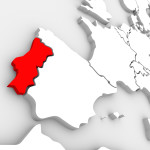 Retiring to the Algarve in Portugal can be an attractive proposition for many expats. Along with the obvious lure of the ‘sun and sea’, there is also the added benefit of low taxation for retirees.
Retiring to the Algarve in Portugal can be an attractive proposition for many expats. Along with the obvious lure of the ‘sun and sea’, there is also the added benefit of low taxation for retirees.
Tax competitiveness is a well-established way of attracting the people you want to work or live in your country. The most obvious examples can be found in the Middle East where most expats pay little or no tax in return for adding their technical skills to their host country’s economy. This in turn adds to GDP and creates profits for local companies.
Tax competitiveness in the EU
The practice of tax competitiveness is also widespread in the EU. Countries, and sometimes cities, apply generous tax benefits to international companies and organisations in order to persuade them to establish operations there. The Netherlands, for example, has the 30% tax ruling whereby qualifying workers can reduce their income tax liability by 30% for 7 years and are not required to declare any offshore savings and/or investments. The reciprocal benefits to the Netherlands come in the form of a boost to the general economy via the creation of employment opportunities for local people and businesses.
The Hague has set its stall out to attract international Non-Governmental Organisations offering generous tax treatment to employees from around the globe. Over the past 20 years, this has led to the establishment of the International Criminal Court, the Organisation for the Prohibition of Chemical Weapons, Europol, and the International Criminal Tribunal for the former Yugoslavia. The Hague likes to be known as the City of Peace and Justice; this strap line is now the city’s official under-title.
Following the financial crisis, all EU countries have had to re-evaluate how their economies work. Stark choices have had to be made in the poorer countries regarding welfare benefits, pensions and tax policy. The medicine has been difficult to swallow, but many would argue it was necessary for the ‘patient’ to recover. Thankfully we are finally seeing some improvement in the Portuguese, Spanish, Greek and Irish economies. Portugal, in particular, has taken a bold step by changing its tax code in order to attract wealthy retirees.
Tax breaks for expats retiring to the Algarve in Portugal
The new taxation policy has taken time to complete as the implications had to be thoroughly examined by rival parliamentary parties within the Portuguese government. However, after the consultation process, legislation was introduced to exempt certain groups from taxation on their pension income. It is by no means a free for all; the exemption does have to be applied for and approved. The rules are as follows:
- Applicants cannot have lived in Portugal for the preceding 5 years
- The pension must emanate from a foreign source
- The special treatment is only available for 10 years
If these conditions are met, retiring expats will be treated as habitual non-residents and enjoy tax-free pensions (including lump-sum payments) for up to 10 years. At the end of the 10-year period, taxation will revert to standard Portuguese rates.
A wide variety of Europeans have seen the attraction of this exemption and retired, or are planning to retire, to Portugal. Many British in particular are retiring to the Algarve area. Quite a number of these have opted for a UK pension transfer overseas into vehicles such as QROPS. It is important however to note that any financial decision should always be considered in the context of one’s overall situation and not in isolation. As well as financial issues, we should all consider our family, health, and life circumstances.
Portugal has taken an adventurous and forward-thinking position with this pension tax legislation in the hope that it results in a more vibrant economy. Perhaps the Algarve should now unofficially be known as ‘the Florida of Europe’!